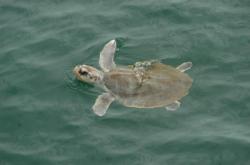Guest blog by Judith Scherff
Kansas is a coastal state. Even though one is unable to drive to a beach within its borders, Kansas has a huge ocean impact because Kansas lies within the Mississippi watershed. Our gifts to the water of the Gulf include:
- farm and yard chemicals – nitrogen and phosphorus for plant growth; toxic chemicals – for killing those living things that we don’t want on our plants;
- sewage – raw sewage from livestock feedlots and municipal sewage treatment systems that don’t work and everything we flush including excreted pharmaceuticals.
Residents of Kansas are as close to the Gulf of Mexico as our next flush. Then there’s the plastic we toss out the window of the car or off the boat.
Someone described the ocean the first time he and his family went to a beach near Houston as looking like chocolate milk. This is the color of what we send to the Gulf of Mexico. This is what we are responsible for – a brown sea.
And so are residents of Missouri, Nebraska, Oklahoma, Arkansas and the 31 states and parts of two Canadian provinces that send effluent into the Gulf by way of our rivers. Can you imagine the volume of effluent – of waste and toxins – we send into the Gulf every day – from residents of a land mass that is 41 percent of the contiguous United States?
There are many species trying to survive in the Gulf, and none more important than the critically endangered Kemp’s ridley sea turtle. Other sea turtle species have a much larger habitat, but the home of the Kemp’s is the Gulf. Nest numbers of the Kemp’s have declined precipitously since the 2010 oil spill – and we are responsible for that, too. Anyone who drives a car gives a nod to oil in such a way that they feel obliged to drill in sensitive ecological areas such as the Gulf and the Arctic. And the carbon dioxide we emit when we drive comes down to the ocean causing acid acidification – yet another problem for nonhuman species.
Those of us who’ve seen these tiny hatchlings – weighing only grams – make their way into the ocean marvel at their determination to be where they instinctively know they belong – to survive against what must seem like mighty waves at first and then against many other challenges. We watch them go into the toxic waters we’ve created. We have every right to be ashamed of our ignorance and lack of concern for one of the oldest, one of the most vulnerable, and one of the most endangered species on Earth.
It is quite likely – given the reasonably generous nature of human beings – that if humans realized our impact on the waters of the Gulf, and realized the critical nature of the Kemp’s ridley, we would step up and not only educate others, but contribute to Gulf restoration and the efforts to save the Kemp’s. The Kemp’s ridley saga is not simply a Gulf Coast issue. Extinction is a national and international issue. One can only imagine the results if even a fraction of the population of those 31 states became active in the effort to save the Kemp’s.
Residents of the coastal states within the Mississippi watershed have a responsibility to clean up our act, restore the Gulf, and insure that the Kemp’s remain on the planet with us. We created the mess – we can clean it up, because the Kemp’s will not survive without human dedication.





